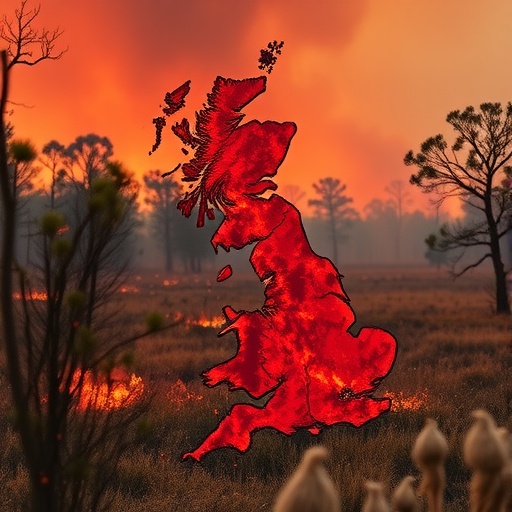The United Kingdom, traditionally known for its temperate and moist climate, has witnessed a dramatic shift in environmental conditions that predispose it to an increased frequency and severity of wildfires. Recent findings published in the prestigious journal Communications Earth & Environment unveil how unprecedented heatwaves are disrupting the natural ecological mechanisms that regulate moisture in vegetation, thereby elevating wildfire risks across the region.
A pioneering study spearheaded by researchers from the University of Birmingham involved an extensive three-year survey meticulously analyzing moisture levels in three critical fuel sources for wildfires: living vegetation, dead vegetation, and carbon-rich soils. This comprehensive dataset, the first of its kind collected across diverse UK landscapes, serves as the bedrock for understanding how climatic anomalies—especially the intense heatwave experienced in 2022—modulate fuel moisture dynamics, a key factor in wildfire propagation.
During the 2022 summer heatwave, the UK grappled with an extraordinary surge in wildfire incidents, marked by a staggering fivefold increase in emergency calls and 14 major wildfire declarations nationwide. The research team’s real-time sampling during this period revealed moisture contents in soil and vegetation that diverged dramatically from patterns observed in prior years. Unlike the normative seasonal fluctuations, the heatwave induced uniform and severe drying across all fuel types, including typically resilient living heather, thereby nullifying the ecological buffer usually provided by these moisture variations.
Under standard climatological conditions, dead heather moisture content is primarily influenced by immediate weather patterns, while living heather exhibits a counterintuitive response: despite drier summer weather, it often accrues moisture during the green-up phase as part of its growth cycle. Soils, a critical carbon reserve and fire fuel, integrate both climatic influences and geological factors such as elevation and bedrock composition, which together dictate their moisture retention capacity. However, these nuanced balances were severely disrupted during the 2022 heatwave, culminating in homogeneously parched fuel that fosters a conducive environment for widespread fire initiation and rapid spread.
Dr. Katy Ivison, the study’s lead author, emphasized the gravity of human-induced climate change by highlighting how escalating extreme weather phenomena are dismantling historical fire resistance in ecosystems. The detailed data show that normally, moisture content disparities among dead heather, living plants, and soils create a balancing interplay, limiting wildfire risk even during periods of low surface moisture. The heatwave’s severity, however, led to a synchronized desiccation of these key fuel components, revealing a critical vulnerability in the UK’s heathlands and peatlands.
Of particular interest is the reversal of conventional wildfire temporal patterns induced by the heatwave. Typically, the spring season records the majority of wildfires, driven by the natural drying of living heather before summer greening phases restore moisture and suppress fire risks. The 2022 data suggest that extreme summer heat can overwhelm living vegetation’s moisture acquisition capacity, thereby extending the wildfire season and enabling fires to propagate across multiple ecological boundaries that were previously less susceptible due to diverse moisture gradients.
Spatial analysis within the study pinpointed Southeast England and East Anglia as epicenters of this anomalous drying phenomenon, correlating sharply with the region’s record-breaking temperatures, such as the historic 40 degrees Celsius registered in Lincolnshire. These findings underscore a troubling trend where areas historically deemed at low summer fire risk may become new hotspots under intensifying heatwave scenarios.
Professor Nick Kettridge, senior author and wildfire specialist, warned that prevailing wildfire risk models might vastly underestimate the threat presented by escalating summer heat. The traditional assumption that fire risk diminishes in summer due to vegetation green-up now appears outdated, calling for urgent recalibration of risk assessments and fire management protocols in line with contemporary climate realities.
The implications of these findings are manifold and troubling. Beyond the immediate threats to human life and property, widespread wildfires pose severe ecological ramifications: degradation of carbon-rich peatlands, loss of habitat for biodiversity, and long-lasting alterations in soil chemistry and hydrology. The research team calls for heightened monitoring and the incorporation of fuel moisture dynamics into a unified UK Fire Danger Rating System to better predict and manage future wildfire risks.
Moreover, the demonstrated link between anthropogenic climate change and amplified wildfire risk highlights a critical feedback loop wherein heatwaves not only directly threaten fuel moisture but also jeopardize carbon sinks, potentially exacerbating global warming. The study thus situates wildfire risk within the broader context of climatic feedback mechanisms demanding integrated mitigation strategies.
Funding for this research was provided by the Natural Environment Research Council (NERC) through the Highlight project Towards a UK Fire Danger Rating System. Further insights and updates on this evolving research can be accessed at the dedicated project website.
In conclusion, this landmark study provides compelling evidence that the UK’s traditionally moderate climate is undergoing a dangerous transformation. The unprecedented uniform drying of vegetation and soils during heatwaves effectively dismantles natural fire resistance, signaling a new era of heightened wildfire risks for the British Isles. Scientists and policymakers alike must heed these warning signs to adapt fire management strategies, safeguard ecosystems, and protect communities in a warming world.
Subject of Research: Impact of unprecedented heatwaves on fuel moisture dynamics and wildfire risk in UK vegetation and soils.
Article Title: Unprecedented UK heatwave harmonised drivers of fuel moisture creating extreme temperate wildfire risk
News Publication Date: 1-Sep-2025
Web References: https://www.nature.com/articles/s43247-025-02746-8, https://ukfdrs.com/
Keywords: Wildfires, Grassland fires, Natural disasters, Droughts, Atmospheric science, Earth sciences, Physical sciences




